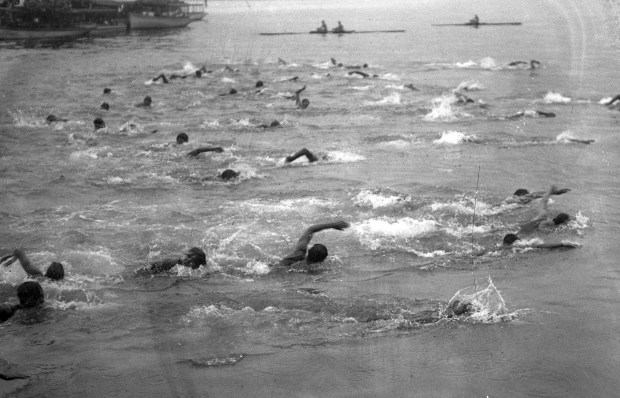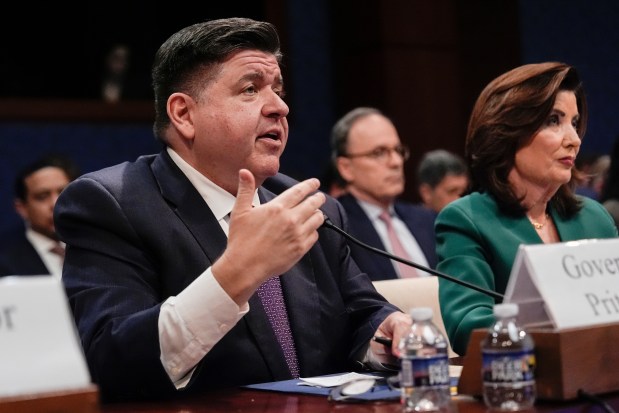As the first wave of swimmers waded a few hundred feet into the 73-degree water Sunday morning at Ohio Street Beach, the rain began to pelt down in earnest. From the concrete trail and the beach, spectators gathered to witness an open-water distance swim on Lake Michigan.
Originally proposed as the first Chicago River Swim in more than a century, it was held in the lake after a late setback to an event over a decade in the making.
Despite the disappointment, organizers still called it an “inaugural moment,” and hundreds of swimmers and their loved ones held on to that spirit by showing up despite the hiccups and drizzly weather. The venue was changed last month as a compromise between organizers and the city, which in July denied a permit for the event, citing safety concerns related to the proposed route and the number of participants.
“We don’t think about the river, but it’s really the reason that Chicago is here in the first place,” said Doug McConnell, founder of Chicago-area nonprofit A Long Swim and the event’s organizer.
“And to think back to (Jean Baptiste Point) DuSable himself,” he said referring to the Haitian trader who founded the city, “and the fact that the river and the lake came together and that that was such an important place for commerce and growth.”
This year’s lake swim will serve as a pilot by allowing organizers and city officials to safely monitor the course and prepare for a swim in the river next year. Event collaborators still hope that, whenever it does happen there, the occasion can showcase the fruit of yearslong efforts to restore the river’s health and strengthen Chicagoans’ bond to it.
The main goal, however, remained the same regardless of the venue: Participants raised over $200,000 to fund ALS research at Northwestern University’s Feinberg School of Medicine and to pay for swim lessons for 2,000 kids in underserved local communities.
Water quality has improved dramatically in the Chicago River. But how safe is swimming?
Instead of the original course between State Street and Wolf Point in the river, Sunday’s swim consisted of a mile-long loop alongside the lakefront trail — half a mile each way — which some participants swam as a 2-mile race and others as a 1-mile race.
Less than 45 minutes after the first group took off, Homer Glen native Rebecca Mann, 26, crossed the finish line first in the 2-mile race. The three other top finishers included: Greg Tracy of Madison, Wisconsin, also racing in the 2-mile swim, and Daphne Menezes of Huntertown, Indiana, and Damon Lucenta of Geneva in the 1-mile swim.
“I’m feeling great,” Mann told the Tribune afterward. “That was a super fun race.”
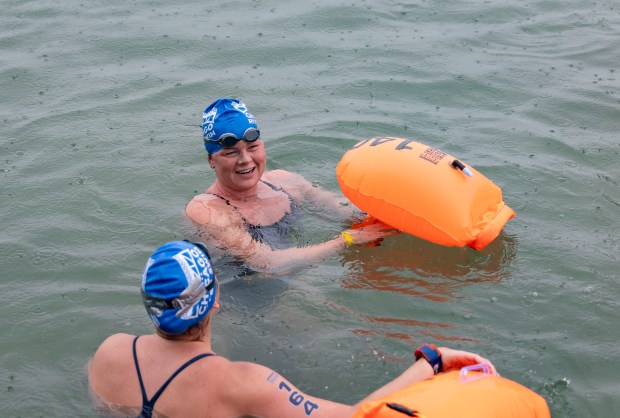
The young athlete is no stranger to open-water swimming: She’s a two-time national champion and a record-setter. When she was 10, she became the youngest person to swim the Maui Channel in Hawaii, a nearly 10-mile stretch from Maui to Lanai, in just under seven hours. At 21, she returned to the archipelago to become the first to complete in the Maui Nui Swim, a three-way, 35-mile channel swim between Maui, Lanai and Molokai that took her almost 21 hours.
Now living and working as a freelance writer in Los Angeles, she returned to her origins in Lake Michigan, where she did her first open-water swim during a triathlon when she was only 5. She has since participated in such events both professionally and for fun, but she particularly enjoys using her athletic skills to support a good cause.
“Being able to swim (here) was absolutely fantastic and it brought back all these great memories,” Mann said. “I would have loved to swim in the river, but I was very happy to swim in the lake as well. I hope that it’s back in the river next year.”
Mariel Hawley Dávila, 55, came to Chicago from Mexico City to participate because, as she told the Tribune, it is important that every swim she does have a purpose. She felt drawn to the fundraising goals, especially to help children in underserved communities learn to swim. “It opens up so many opportunities,” she said in Spanish.
Like Mann, Hawley Dávila has done an open-water swim in Hawaii. She swam 23 miles to cross the Moloka‘i or Kaiwi Channel between the islands of Moloka’i and O’ahu as part of the Oceans Seven challenge. She was the 15th person to complete that race in 2019 and also has swum the English Channel, the Cook Strait in New Zealand, the North Channel between Ireland and Scotland, the Catalina Channel between Los Angeles and Santa Catalina Island, the Tsugaru Strait in Japan and the Strait of Gibraltar.
“I think if you really want to do this in the river, you need international awareness,” she said and referred to the Olympics open swimming competitions in July being held in Paris’ iconic Seine River after much initial contention and canceled test runs due to water quality concerns.
Participants on Sunday included many like Mann and Hawley: Ironman and Chicago triathletes, a former Olympian and longtime open-water swimmers, from across the country and beyond. Many had a personal connection to amyotrophic lateral sclerosis or ALS, a fatal neurological disorder known also as Lou Gehrig’s disease.
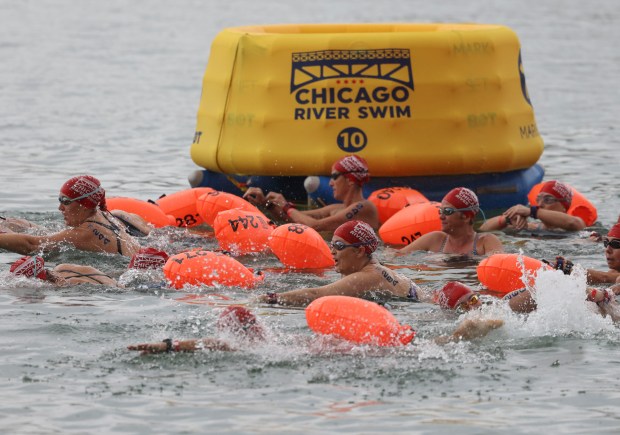
Cedarburg, Wisconsin, native Heather Berken’s mother died of ALS when she was 25. She’d take her to support groups and attend caregiver support groups herself, but since then, Berken, now 52, felt she didn’t have a community for a while — until she began swimming and fundraising.
“It is an excuse to talk about my mother and sort of like, reconnect with people,” she said. “Sometimes it does make me sad. I wish we could have had things to make my mother’s life easier. But I’m so grateful now that new patients have so many options. It’s not just about research to cure ALS, but to make people able to live in a more comfortable way, because you’re a prisoner in your own body.”
McConnell, the event founder, said Sunday that watching a loved one suffer from ALS can feel like watching an agonizing “slow-motion shipwreck” — something the Barrington resident is familiar with since his father was diagnosed and died in 2006 with the disease.
“It’s so frustrating,” he said, “because you’re just so powerless in watching somebody just kind of come apart.”
His sister was diagnosed with it shortly after that. It was her idea to raise funds for research at a Northwestern lab led by neurologist Hande Özdinler, by participating in open-water swims around the country and the world.
A competitive swimmer for over five decades, McConnell began when he was 6 years old, became part of the swimming team at University of Illinois during college and began open-water swimming in 2009.
The idea to use some of the money raised through the event to pay for swimming lessons for thousands of local kids came to organizers as an opportunity to provide lessons for those who might not be able to afford them. Black and Hispanic people are less likely to know how to swim than any other racial or ethnic groups in the United States.
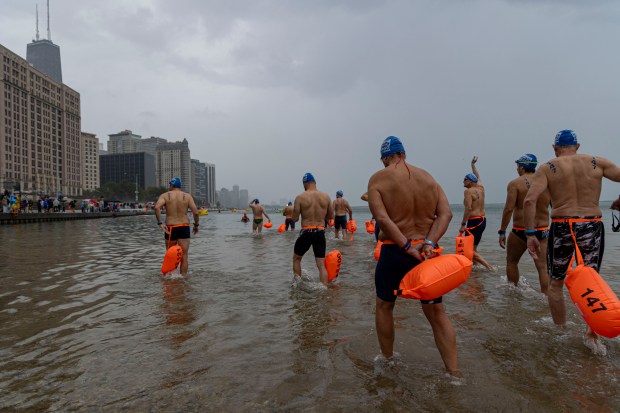
Experts have found that even a few lessons can significantly decrease the risk of drowning, McConnell said. Not only that, he said he hopes lessons can help create generational change by promoting safe recreation.
“Those of us who have grown up swimming don’t appreciate how many little children are not water-safe,” McConnell said as he presented a check for $50,000 to Lt. Shanell Debela, pastor and CEO of the Salvation Army Kroc Corps Community Center in West Pullman. “We think that swimming is a human right, and we want to help the children in underserved communities to be water-safe and perhaps join us in the Chicago River Swim.”
The idea to host a swim in the river downtown first emerged when McConnell learned about a swim held at the end of every summer in the canals of Amsterdam, which also raises money for ALS research.
“And, boy, the videos that we were watching — I mean, it just looks so much like the Chicago River, we just couldn’t get over it,” he recalled.
He said in the last decade of planning, one of the biggest hurdles they’ve faced has been the public’s perception.
“For so many of us who’ve grown up around Chicago, imagining swimming in the Chicago River, it just blows people’s heads off,” he said. “They’ve got these perceptions — preconceptions, maybe, is a better word — left over from the 1950s or 1970s. … It’s not that way anymore, and what a tremendous resource it is.”
Before the swim started, U.S. Rep. Mike Quigley told the Tribune that, during the Democratic National Convention in August, he had sat by the water with fellow members of Congress from the West and South who were in awe of the enormousness of Lake Michigan.
“We take this for granted,” he said. “They’re worried about wildfires, and they’re worried about water. … We’re so lucky with it. We undervalue and underappreciate it.”
Tiny pieces of plastic pose one of the biggest threats to Chicago River wildlife and water quality
In the Chicago River, he sees a similarly rich and perhaps more misunderstood natural resource. He said former Mayor Richard J. Daley shared with visiting congressmen more than 50 years ago a vision for a river so clean people could fish in it during lunch hour.
“People from the Loop could catch fish in the Chicago River and barbecue them on grills we’ll put in lower Wacker Drive,” Daley would say.
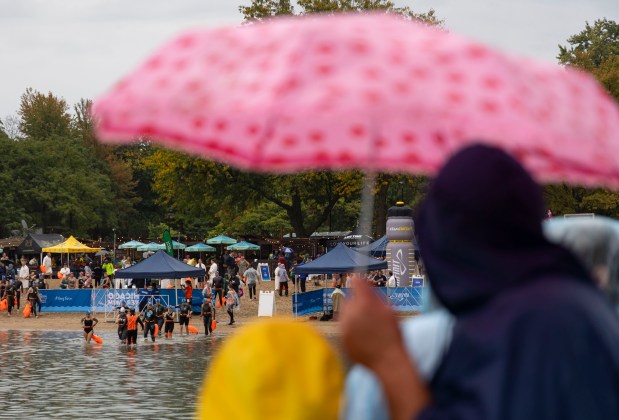
Quigley said great progress has been made in cleaning up the river and expanding recreational access to it. Now, it is home to a thriving economy and restored wildlife, including migratory birds, beavers and turtles, as well as 80 species of fish — up from fewer than 10 in the 1970s.
“Once people see that and appreciate it, they start fighting for it,” he added. “It’s just been a great success story. Unfortunately, we’re probably at Step 2 of Step 10. But you envision a time when our kids and our grandkids will do what Richard J. Daley talked about.”
After the event, organizers said in a news release that they remained optimistic about the future and felt hopeful next year’s swim would take place in the Chicago River, making history and shining a spotlight on efforts to revitalize its waters.
“Though we had to shift the venue this year, the spirit of the Chicago River Swim remains intact. The energy was incredible, and this is just the beginning,” McConnell said. “Next year, we hope to swim in the river and bring this event even closer to Chicago’s heart.”


